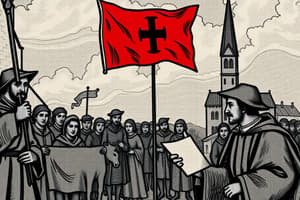Podcast
Questions and Answers
What was a major consequence of the Peasants' Revolt?
What was a major consequence of the Peasants' Revolt?
- The deaths of hundreds of people, including nobles, clergy, and rebels (correct)
- The end of the Hundred Years' War with France
- The abolition of the English parliament
- The establishment of a new monarchy in England
What was a key factor leading to the Peasants' Revolt?
What was a key factor leading to the Peasants' Revolt?
- The influence of the Catholic Church
- The shortage of labor due to the Black Death (correct)
- The rise of the merchant class
- The formation of the English parliament
What was the significance of the Statute of Cambridge in relation to the Peasants' Revolt?
What was the significance of the Statute of Cambridge in relation to the Peasants' Revolt?
- It restricted the movement of laborers, fueling resentment (correct)
- It abolished serfdom in England
- It ended the Hundred Years' War with France
- It established the English parliament
Who was a charismatic leader of the Peasants' Revolt?
Who was a charismatic leader of the Peasants' Revolt?
What was a major outcome of the Peasants' Revolt?
What was a major outcome of the Peasants' Revolt?
What was the main motivation behind the Peasants' Revolt?
What was the main motivation behind the Peasants' Revolt?
What was the immediate result of the Peasants' Revolt?
What was the immediate result of the Peasants' Revolt?
What was the impact of the Peasants' Revolt on English history?
What was the impact of the Peasants' Revolt on English history?
What was the significance of John Ball in the Peasants' Revolt?
What was the significance of John Ball in the Peasants' Revolt?
What was the event that marked the beginning of the Peasants' Revolt?
What was the event that marked the beginning of the Peasants' Revolt?
Flashcards are hidden until you start studying
Study Notes
Peasants' Revolt
Events
- 1381: The Peasants' Revolt, a major uprising of peasants and laborers, takes place in England
- The revolt begins in Essex and spreads to Kent, London, and other parts of the country
- The rebels, led by Wat Tyler, march on London, burning and looting as they go
- The rebels occupy the Tower of London, killing several officials and nobles
- The revolt is eventually put down by the Lord Mayor of London and the king's forces
Causes
- The Black Death (1348-1350) leads to a shortage of labor, causing wages to rise and social unrest
- The English monarchy and nobility impose heavy taxes on the peasants to finance wars with France
- The Statute of Cambridge (1381) restricts the movement of laborers, further fueling resentment
- The peasants are also motivated by a desire for social and economic reform
Leaders
- Wat Tyler: A charismatic leader from Essex who becomes the face of the rebellion
- John Ball: A radical priest who preaches about social equality and supports the rebels
- Jack Straw: A mysterious figure, possibly a pseudonym for Wat Tyler or another leader
Historical Significance
- The Peasants' Revolt marks a turning point in English history, as it challenges the feudal system and the power of the nobility
- The revolt leads to the abolition of serfdom and the establishment of more equitable labor laws
- The event inspires future social and political movements, including the English Civil War and the French Revolution
Impact
- The revolt results in the deaths of hundreds of people, including nobles, clergy, and rebels
- The event leads to a period of social and economic change in England, as the monarchy and nobility are forced to address the grievances of the common people
- The Peasants' Revolt sets a precedent for future protests and uprisings, demonstrating the power of collective action to effect change
Peasants' Revolt
Events
- 1381: A major uprising of peasants and laborers takes place in England
- Revolt begins in Essex and spreads to Kent, London, and other parts of the country
- Rebels, led by Wat Tyler, march on London, burning and looting as they go
- Rebels occupy the Tower of London, killing several officials and nobles
- Revolt is eventually put down by the Lord Mayor of London and the king's forces
Causes
- Black Death (1348-1350) leads to labor shortage, causing wages to rise and social unrest
- English monarchy and nobility impose heavy taxes on peasants to finance wars with France
- Statute of Cambridge (1381) restricts laborer movement, further fueling resentment
- Peasants motivated by desire for social and economic reform
Leaders
- Wat Tyler: Charismatic leader from Essex and face of the rebellion
- John Ball: Radical priest who preaches about social equality and supports rebels
- Jack Straw: Mysterious figure, possibly a pseudonym for Wat Tyler or another leader
Historical Significance
- Peasants' Revolt marks a turning point in English history, challenging feudal system and nobility's power
- Revolt leads to abolition of serfdom and establishment of more equitable labor laws
- Event inspires future social and political movements, including English Civil War and French Revolution
Impact
- Revolt results in deaths of hundreds of people, including nobles, clergy, and rebels
- Event leads to period of social and economic change in England, forcing monarchy and nobility to address common people's grievances
- Peasants' Revolt sets a precedent for future protests and uprisings, demonstrating power of collective action to effect change
Studying That Suits You
Use AI to generate personalized quizzes and flashcards to suit your learning preferences.




